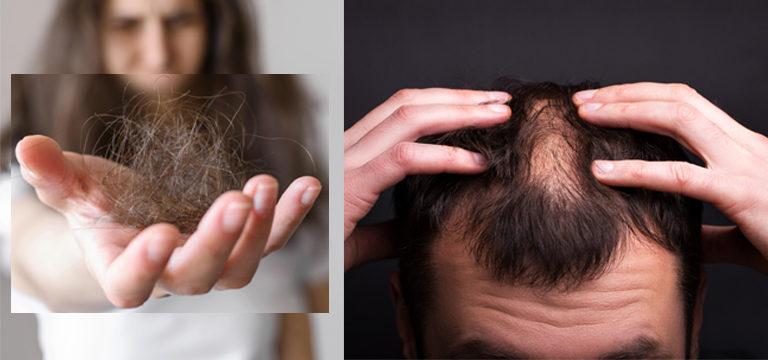Many people have reportedly seen noticeable hair loss after a long bout of fever that usually accompanies a COVID-19 infection. While it is usually perceived as hair loss, it is actually hair shedding, better known as telogen effluvium in medical circles. In this blog post, we’re going to look at the causes of telogen effluvium how to manage it.
Noticeable Hair Shedding
During a fever, your body’s immune response is heightened, and this physiological stress can cause hair follicles to prematurely enter the telogen, or resting, phase of the hair growth cycle. When this happens, more hair follicles begin shedding, resulting in increased hair loss. It’s important to note that this hair loss is typically temporary, and most individuals who experience telogen effluvium due to a fever will see their hair return to its normal growth cycle once the underlying illness is resolved.
While telogen effluvium caused by a COVID-19 fever doesn’t typically involve specific scalp symptoms like redness or itching, it can be emotionally distressing for those affected. It’s crucial to remember that hair loss in this context is a temporary response to the fever and is not a permanent condition. Suppose you’re concerned about hair loss related to COVID-19 or any other illness. In that case, it’s advisable to consult with our healthcare professionals or dermatologists for a proper evaluation and guidance on managing the issue.
Without guidance from the required professionals, the condition can have negative emotional and psychological effects on you. Anxiety, and a negative impact on self-esteem will only make your state of mind turn for the worse.
Hair Growth Tends to Resume Normally
There is a silver lining to this condition, after all! It is generally a temporary condition and typically reversible. As your body recovers from the illness and the underlying stress factors subside, your hair follicles will gradually return to their normal growth phases. Continued hair loss due to COVID-19 is a sign that your body is responding to stress, and once that stress is resolved, the hair growth cycle tends to normalize. Knowing that it is temporary can provide you with some much-needed relief since individuals will see their hair return to its previous state as their health improves.
Where’s The Catch?
You are probably asking yourself, what if normal hair growth isn’t restored? In the rare case of that happening, you need to seek help and guidance. A competent hair loss care clinic like L&P Aesthetics can give you the guidance you need to keep your mind at ease. As is the case with managing hair loss, it involves a concerted effort to help you overcome the challenge. Here’s how that should work.
Understand the Cause: Our experts will work with you to understand the potential causes of your hair loss. It could be related to factors other than the illness, such as genetics, hormonal changes, medications, or nutritional deficiencies.
Treatment Options: Based on the diagnosis, our experts can recommend appropriate treatment options. Treatment may include medications, topical solutions, lifestyle changes, or nutritional supplements, depending on the cause of your hair loss.
Patience and Time: It’s important to remember that hair growth is a slow process. Even with effective treatment, it may take several months to see noticeable improvements in hair thickness and density. Our experts will guide you through the recommended treatments in the consultation process.
Manage Stress: Reducing stress is beneficial for your overall health. But it has a positive impact on your hair health, too. Engage in stress-reduction techniques such as meditation and stretching.
Healthy Lifestyle: Maintain a healthy lifestyle with a balanced diet rich in essential nutrients, regular exercise, and adequate sleep. Nutritional deficiencies can contribute to hair loss.
Avoid Self-Diagnosis and Over-the-counter Remedies: While over-the-counter hair growth products may be tempting, it’s best to consult with a healthcare professional before trying them. Self-diagnosis and inappropriate treatments can sometimes worsen the issue.
Support Groups: Consider joining support groups or forums where individuals share their experiences with hair loss. It can be reassuring to connect with others who have gone through similar situations and gain insights into coping strategies.
In conclusion, while the relationship between COVID-19 stress and hair loss is complex and multifaceted, there is mounting evidence to suggest that the two are indeed connected. The stress induced by the pandemic can lead to a range of physical and psychological health issues, and hair loss is just one of the many potential manifestations. It’s important to remember that while hair loss can be distressing, it is often temporary and can be managed with the right care and attention.
Ultimately, while COVID-19 stress may be a factor in hair loss for some individuals, it’s just one piece of the puzzle. By focusing on holistic self-care and resilience, we can help you better cope with the challenges that the post-pandemic world presents.
Talk to our experts today!
